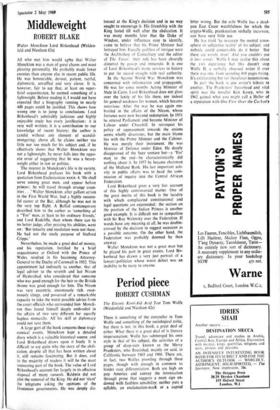Middieweig►ht
ROBERT BLAKE
All who met him would ag*e that Walter Monckton was a man of great charm and most pleasing personality. He probably made fewer enemies than anyone else in recent public life. He was honourable, devout, patient, tactful, diplomatic, unruffled and very clever. It is, however, fair to say that, at least on super- ficial acquaintance, he seemed something of a lightweight. Before reading it, I would not have expected that a biography running to nearly 400 pages could be justified. This shows how wrong one is to jump to conclusions. -Lord Birkenhead's admirably judicious and highly enjoyable study has every justification: it is very well written; it is a contribution to our knowledge of recent history; the author is candid without any element of scandal- mongering; above all, he claims neither too little nor too much for his subject and, if he effectively shows that Walter Monckton was not a lightweight, he never falls into the oppo- site error of suggesting that he was a heavy- weight either in law or politics.
- The interest in Monckton's life is its variety. Lord Birkenhead prefaces his book with a quotation from Ecclesiasticus xxxix. 4, 'He shalt serve among great men, and appear before princes: he will travel through strange coun- tries ...' Walter Monckton, after gallant action in the First World War, had a highly success- ful career at the Bar, although he was not in the very top flight. A Balliol contemporary described him to the author as 'something of a "Yes" man, at least to his ordinary friends,' and Lord Radcliffe, -than whom there can- be no better judge, after praising his abilities, went on: 'But tenacity and resolution were not there. He had not the steely purpose of Stafford Cripps.'
Nevertheless, he made a great deal of money, and his reputation, fortified by a brief acquaintance at Oxford with the Prince of Wales. resulted in his becoming Attorney- General to the Duchy of Cornwall in 1932. This appointment led indirectly to another, that of legal adviser to the seventh and last Nizam of Hyderabad, who considered that someone who was good enough for the heir to the British throne was good enough for him. The Nizam was very eccentric, enormously rich. enor- mously stingy, and possessed of a remarkable capacity to take the worst possible advice from the court officials who surrounded him Monck- ton thus found himself deeply embroiled in the affairs of two very different bu' equally hapless monarchs. All his skill at diplomacy could not save them.
A large part of the book concerns these tragi- comical events. Monckton kept a detailed diary which is a valuable historical source, and Lord Birkenhead draws upon it freely It is difficult to say quite why the story of the abdi- cation, despite all that has been written about it, still remains fascinating. But it does, and to the majority of readers it will be the most interesting part of the book. The value of Lord Birkenhead's account lies largely in its effective disposal of many canards. Baldwin did not plot the removal of the King. He did not 'slant' the telegrams asking the opinions of the Dominion govetnments. He was deeply dis- tressed at the King's decision and in no way sought to encourage it. His friendship with the King lasted till well after the abdication. It was many months later that the Duke of Windsor, under influences easy to identify, came to believe that his Prime Minister had betrayed him. Equally guiltless of intrigue were the Archbishop of Canterbury and the editor of The Times: their role has been absurdly distorted by gossip and innuendo. It is one of Lord Birkenhead's many services to history to put the record straight with real authority.
In the Second World War Monckton was concerned with information and propaganda. He was for some months Acting Minister of State in Cairo. Lord Birkenhead does not gloss over the laxity of his life there, nor indeed his general weakness for women, which became notorious. After the war he was again em- broiled in the affairs of the Nizam, whose fortunes were now beyond redemption. In 1951 he entered Parliament and became Minister of Labour under Churchill. In retrospect his policy of appeasement towards the unions seems wholly disastrous, but the main blame lies with the Prime Minister and the Cabinet. He was merely their instrument. He was Minister of Defence under Eden. He deeply disapproved of the Suez venture but—a 'Yes' man to the end—he characteristically did nothing about it. In 1957 he became chairman of the Midland Bank. His last important acti- vity in public affairs was to head the com- mission of inquiry into the Central African Federation.
Lord Birkenhead gives a very fair account of this highly controversial matter. One of the great merits of this book is the lucidity with which complicated constitutional and legal questions are expounded: the section on the position of the Indian Princes is another good example. It is difficult not to sympathise with Sir Roy Welensky over the Federation. If words have any meaning at all, he was double- crossed by the decision to suggest secession as a possible outcome. On the other hand, the Federation was probably doomed by then anyway. Walter Monckton was not a great man but he played his part in great events. Lord Bir- kenhead has drawn a very just portrait of a lawyer/politician whose worst defect was an inability to be nasty to anyone.


































 Previous page
Previous page